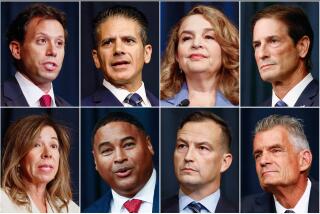Consultant Concerned by High Political TV Ad Costs
- Share via
A consultant who helped make Democratic Sen. Alan Cranston’s television commercials in the recent election said Tuesday that the cost of campaigns will continue to soar unless television stations are forced to offer much lower rates for political ads.
“It is a constantly escalating process,” Washington consultant Robert Shrum told a group of reporters in Los Angeles. “We saw the rate we had to pay (to put ads on the air) go up just between the primary in June and the general election in November.
Low-Cost Air Time
“Maybe it should be a condition for a station holding a license that they provide low-cost time for political ads,” Shrum said.
The Federal Communications Commission requires stations to offer the lowest unit rate to political candidates. But as industry experts have noted, the increasing popularity of the television ad as a campaign tool has made the air time an increasingly valuable commodity, driving up rates.
Whatever is worked out, Shrum said, the 30-second political spot is here to stay.
“Paid media (commercials) is the best way to rifle-shoot your message to a voter. . . . If you hold a pancake breakfast to draw attention to a candidate’s flip-flops, then he just serves waffles to go after you. What you get is a muddy story in the press and that’s not much help.”
Shrum was referring to an event Cranston staged right after the June primary to ridicule Republican nominee Ed Zschau’s inconsistent voting record in the House.
Loss of Impact Cited
Zschau tried to one-up Cranston by serving waffles at his own press breakfast and discussing Cranston’s own inconsistencies. As a result, the Cranston campaign felt it did not get as much impact out of the event in newspaper and television news coverage.
But while campaign coverage by the press--known in politics as “free media”--does not play the same role it once did, Shrum said, such coverage can be crucial in the closing weeks of a close race.
He noted that the coverage Cranston got in the last two weeks of the recent election--when the senator toured California by bus to call attention to his accomplishments--fit right in with the TV ads the campaign was running, which depicted Cranston as a California treasure who has fought for the environment and for human rights.
Zschau, meanwhile, struggled in the closing days and the press coverage reflected it.
Cranston beat Zschau by 116,622 votes.
Jolt in September
Shrum said he got a scare right after Labor Day when, for a six-week period, Cranston did not have enough money to run all of the ads they wanted to put on the air.
Zschau, meanwhile, hammered Cranston in the month of September with $2.5 million worth of negative commercials. By October, Cranston’s 15-point lead over Zschau had been cut in half.
“We survived that because Alan had done a good job against Zschau over the summer and built up a big enough lead,” Shrum said, adding that the fund-raising picked up enough for Cranston to pay for a final TV blitz.
Shrum said Zschau was the toughest Republican Cranston could have faced from the 13-person field in the GOP primary.
“Zschau’s problem was that he had a House voting record we could go after. . . . Pete Wilson (former San Diego mayor and now Republican senator) was better positioned when the Republicans nominated him in 1982 because he didn’t have a House voting record,” Shrum said.
More to Read
Get the L.A. Times Politics newsletter
Deeply reported insights into legislation, politics and policy from Sacramento, Washington and beyond. In your inbox twice per week.
You may occasionally receive promotional content from the Los Angeles Times.










